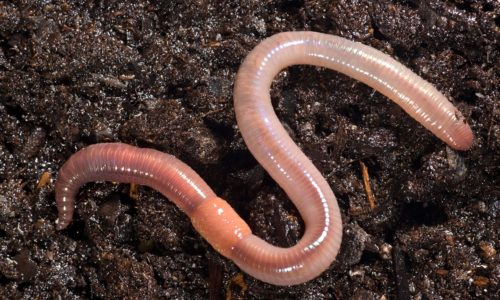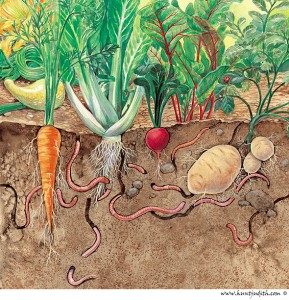From a young age, we’re taught that earthworms are our friends. Out at Petaluma Bounty Farm, I worked (ehem, played) in the fields with what felt like millions of kids who hadn’t been exposed to many vegetable gardens before. And you know what, they too squealed in delight upon finding a worm!
While there are so many things about our soil health that we can’t understand just by looking at it (see my past posts on soil biology), finding earthworms in our soil is always a good sign. But why? Who really knows the intricacies of what these worms do for our soil, or what their presence indicates?

What Draws Earthworms to Your Soil
Certain conditions are highly favorable to earthworms. For one, they like a lot of moisture. As we’ve talked about in the past, soil that is high in organic matter is able to hold on to way more moisture than deficient soil. They also prefer loam, and temperatures between about 50 – 65 degrees. Sound like pretty favorable conditions for the gardener, too.
Let’s take a look at what worms are adding to your soil now that we know what draws them there.
Benefits to Soil Structure
- Worms reduce soil compaction. As worms burrow into your soil they open up channels through the soil, creating pores where there once was soil hard masses.
- Worms aid in soil aeration. Think about the process of aerating a lawn – you drill out little slivers of soil in order to make more space for air. That’s just what earthworms do!
- Worms let water infiltrate the soil. If your soil is anything like mine, it can only absorb so much water before it just sits there, unable to penetrate to lower levels. When worms dig furrows, they create perfect little waterslides to transport water deep below.

Chemical and Biological Benefits
- Worms neutralize pH. When they ingest and process your soil, their excrement is rendered neutral in the process. Pretty cool right?
- Worms add microbes. Their excrement is chalk-full of beneficial microbes that help to break down organic matter in the soil.
- Worms eat nematodes. While there are nematodes out there that are beneficial to your soil ecosystem, there are others that are harmful. Worry not, for earthworms love to snack on the harmful ones.
- Worms add nutrients that are readily available to plants. Depending on your soil type, there are many nutrients that are not ready to be taken up by plants. Worm castings are full of readily available nutrients such as nitrogen, phosphorus, and potassium.
Taking all of these factors into consideration, what’s not to love about earthworms? Follow the guidelines that will lead you to having healthy soil, then watch the worms appear, and take a look at what they add to the soil over time. Let us know what worms have done for your soil in the comments below!







 Family
Family

